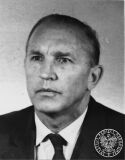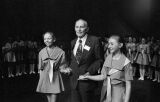back...Dr Roman Hrabar

Roman Hrabar was born on 28 March 1909 in Kolomyia, then annexed to Austria. His parents were Stefan and Wanda Hrabara. He received a sound education, including piano lessons in Vienna.
From 1928 to 1932, he studied law at the Jan Kazimierz University in Lviv and at the Jagiellonian University in Cracow. Two years after his graduation, the Hrabar family moved to Silesia. Roman Hrabar took a job in the office overseeing mine operations.
Just before the Second World War, he was employed at the Chief Prosecutor's Office in Warsaw. During the occupation he undertook doctoral studies at a secret university. Before the outbreak of the Warsaw Uprising in 1944, he passed his doctoral examination. The basis for the degree was a dissertation on commercial law.
After the fall of the Warsaw Uprising, he left for Cracow. There he was arrested by the Gestapo and taken to Montelupich prison. A few days after the Nazis left Silesia in February 1945, he returned to Katowice and took up the post of head of the Department of Labour and Social Welfare in this city. Many of the office's customers requested help in locating their children who had been taken from them by the Germans during the war. It was a pivotal moment in his life because it was then that he first formally encountered the problem of Germanised children. In March 1947, he was appointed Government Plenipotentiary for the Reclaiming of Polish Children from Germany.
Roman Hrabar went to Germany and established cooperation with the Polish Red Cross delegation in Germany and the United Nations Relief and Rehabilitation Administration (UNRRA), which had been searching for and returning children deported to Germany since 1945. He started his mission in Bavaria, Regensburg, and then moved his office to Ludwigsburg and Berlin. At the time, the reclaiming of 25 children from Schloss Hubertus, where the orphanage staff refused to release them and maintained that they were of German nationality, was considered a major success.
In three years, Hrabar managed to find and return thousands of children to their families in Poland. One of them was Alodia Witaszek, daughter of the doctor Franciszek Witaszek, who was murdered by the Germans for sabotage activities. Alodia and her sister Daria were arrested and taken to the German concentration camp for Polish children on Przemyslowa Street in Lodz and then to Gaukinderheim in Kalisz. The girls' names and surnames were changed; Alodia became Alice Wittke and Daria became Dora Wittke. They were separated and then placed with different foster families. Hrabar's experience of reclaiming Germanised children was used in the Eighth Nuremberg Trial, of which he was a participant.
In 1948, he returned to Poland and started working for the Ministry of Labour and Social Welfare, and in the 1950s he started practising law in Katowice. The authorities in Warsaw completed the reclaiming process in 1950. Between 1946 and 1950, only about 30,000 of the probably almost 200,000 deported children were brought back to Poland.
In 1969, Hrabar was appointed by the Ministry of Justice as a delegate at the United Nations to investigate Nazi crimes. He worked closely with the Main Commission for the Investigation of Nazi Crimes in Poland, of which he was a member. He was one of the few specialists in Poland to deal with the subject of child martyrdom. He was active in the field of research on crimes against children during the Second World War. In 1971, at the Silesian Scientific Institute in Katowice, he defended his second doctoral thesis entitled Polenlager.Nazi camps for the Polish population in Silesia 1942-1945 [Polenlagry. Hitlerowskie obozy dla ludności polskiej na Śląsku 1942-1945].
Between 1972 and 1974, he was called as an expert witness during the notorious trial of Eugenia Pohl, a female guard from the camp on Przemyslowa Street in Lodz. He also continued to search for the stolen children, who were adults then.
In 1985, he was awarded the Order of the Smile. During the decoration ceremony, the participants were left with his words: “I’ve entrusted my soul to children."In addition to his activities strictly devoted to reclaiming cases and the practice of law, Roman Hrabar wrote poetry and was the author of radio plays. He produced articles and monographs on the martyrdom of children, including: Lebensborn, czyli źródło życia [Lebensborn, or the Source of Life](1980), Janczarowie XX wieku [Janissaries of the 20th Century] (1983) and Skazane na zagładę [Doomed to Extinction] (1989). Friends and colleagues remembered him as an extremely humble and helpful man who never refused to help anyone.

Roman Hrabar died on 28 September 1996 at the age of 87.
In 2019, the Silesian Bar Association, in cooperation with the Katowice branch of the Institute of National Remembrance, produced a film dedicated to Roman Hrabar, which was published in the series of documentaries “Archives of the Bar”[„Archiwa Palestry”].
